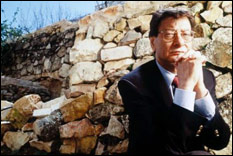 I touch you as a lonely violin touches the suburbs of the faraway place
I touch you as a lonely violin touches the suburbs of the faraway place
patiently the river asks for its share of the drizzle
and, bit by bit, a tomorrow passing in poems approaches
so I carry faraway’s land and it carries me on the road
On a mare made of your virtues, my soul weaves
a natural sky made of your shadows, one chrysalis at a time.
I am the son of what you do in the earth, son of my wounds
that have lit up the pomegranate blossoms in your closed-up gardens
Out of jasmine the night’s blood streams white. Your perfume,
my weakness and your secret, follows me like a snakebite. And your hair
is a tent of wind autumn in color. I walk along with speech
to the last of the words a bedouin told a pair of doves
I palpate you as a violin palpates the silk of the faraway time
and around me and you sprouts the grass of an ancient place — anew
Translated by Fady Joudah. Reprinted with permission from the author
and translator from The Butterfly’s Burden, Copper Canyon Press, 2007.
***
Cadence Chooses Me
Cadence chooses me, it chokes on me
I am the violin’s regurgitant flow, and not its player
I am in the presence of memory
The echo of things pronounces through me
then I pronounce…
Whenever I listen to the stone I hear
the cooing of a white pigeon
gasp in me:
My brother! I am your little sister,
so I cry in her name the tears of speech
And whenever I see the zanzalakht trunk
on the way to the clouds,
I hear a mother’s heart
palpitate in me:
I am a divorced woman,
so I curse in her name the cicada darkness
And whenever I see a woman on a moon
I see love a devil
glaring at me:
I am still here
but you won’t return as you were when I left you
you won’t return, and I won’t return
Then cadence completes its cycle
and chokes on me…
Translated by Fady Joudah. Reprinted with permission from the author
and translator from The Butterfly’s Burden, Copper Canyon Press, 2007.
****
Another Day Will Come
Another day will come, a womanly day
diaphanous in metaphor, complete in being,
diamond and processional in visitation, sunny,
flexible, with a light shadow. No one will feel
a desire for suicide or for leaving. All
things, outside the past, natural and real,
will be synonyms of their early traits. As if time
is slumbering on vacation… “Extend your lovely
beauty-time. Sunbathe in the sun of your silken breasts,
and wait until good omen arrives. Later
we will grow older. We have enough time
to grow older after this day…”/
Another day will come, a womanly day
songlike in gesture, lapis in greeting
and in phrase. All things will be feminine outside
the past. Water will flow from rock’s bosom.
No dust, no drought, no defeat.
And a dove will sleep in the afternoon in an abandoned
combat tank if it doesn’t find a small nest
in the lovers’ bed…
Translated by Fady Joudah. Reprinted with permission from the author
and translator from The Butterfly’s Burden, Copper Canyon Press, 2007.
--------------------------------------
Mahmoud Darwish is one of the most admired Arab poets of today. He was born in Birwe, a village in upper Galilee, in 1942. In 1948, he fled with his family to Lebanon when the Israeli Army destroyed his village. A former member of the PLO’s Executive Council, and the Poet Laureate of Palestine, he wrote the 1988 Palestinian Declaration of Independence.
Darwish has published more than thirty books of poetry and prose, which have been translated into 35 languages, influencing and innovating modern poetic forms. He received international recognition as a French Knight of Belle Arts and Letters, and in 2002, he was awarded the Lannan Cultural Freedom prize. In 2005, he received the prestigious Prins Claus award for poetic achievement from Holland.
He now splits his residence between Ramallah, where he continues to edit the internationally acclaimed literary review, Al-karmel, and Amman, Jordan. More information can be found at: www.mahmouddarwish.com.
The following poems are reprinted from Mahmoud Darwish’s most recent book in English, The Butterfly’s Burden, from Copper Canyon Press, translated by Fady Joudah. The Butterfly’s Burden presents three recent books in a single volume, each translated into English for the first time: The Stranger’s Bed (1998), Darwish’s first collection of love poems; State of Siege (2002), a terse, politically charged sequence written in Ramallah; and Don’t Apologize For What You’ve Done (2003), a song “green like the phoenix” after the daily horrors in Ramallah. These poems provide continual contrasts, balancing old literary traditions with new, highlighting lyrical, loving reflections alongside a bitter longing for the Palestine that he lost. Darwish seeks conversation across national borders while continuing to expand the borders of poetry.